|
Political Punk Rock takes Center stage
|
|
With songs written by rock band Green Day, “American Idiot” examines post-9/11 life in the United States
|
|
By Michael Gallant
|
|
|
On September 11, 2001, images of the collapsing World Trade Center towers were seen around the globe. Much less visible to the international community, though, were the effects of the attacks on young Americans. What did it mean for them to come of age in a time newly defined by fear and war? This is a central question that the Broadway show “American Idiot”—fueled by punk rock music written by the band Green Day—attempts to answer.
Through searing guitars and crashing drums, powerful vocals and bombastic choreography, the show tells stories of these young Americans. In the process, it also brings to center stage a facet of American life that might surprise many in the international community.
The show portrays a more nuanced youth response born within U.S. suburbs—one of detachment and frustration, but with an underlying core of resilience throughout.
|
|
|
|
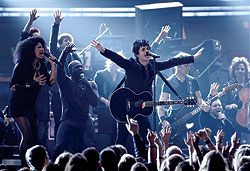
|
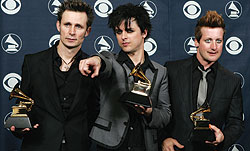
|
|
Green Day rock band and the cast of “American Idiot” perform at the 2010 Grammy Awards in Los Angeles, California.
Photograph by MATT SAYLES © AP-WWP
|
Green Day members Mike Dirnt (from left), Billie Joe Armstrong and Tré Cool with their record of the year Grammy Award for “Boulevard of Broken Dreams,” a track from the album “American Idiot,” in 2006.
Photograph by REED SAXON © AP-WWP
|
|
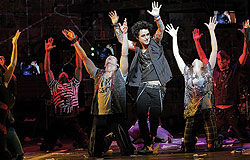
|
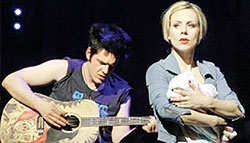
|
|
Armstrong performs with the cast of the Broadway show, “American Idiot”
|
Michael Esper and Mary Faber play estranged young parents
|
|
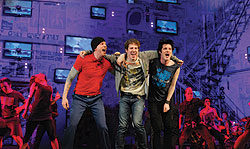
|
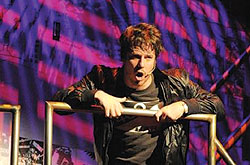
|
|
Stark Sands (from left), Gallagher, Jr. and Michael Esper perform in the Broadway production of the play
|
John Gallagher, Jr. as Johnny in “American Idiot.”
Photograph by KEVIN BERNE
|
|
|
|
From album to stage
“American Idiot” began its life not as a Broadway show, but as a rock album of the same name. Green Day released the album in 2004 and it quickly became an international hit, reaching No. 1 in multiple countries and selling over 12 million copies worldwide.
The band began working with theater director Michael Mayer to create a stage adaptation, which premiered in Berkeley, California in 2009 before moving to Broadway in 2010. On stage, “American Idiot” chronicles the journeys of friends Johnny, Tunny and Will, as they attempt to remedy their collective restlessness by traveling to the big city. Before they depart, Will discovers that his girlfriend is pregnant and decides to stay home; the challenges of becoming a parent prove too much for him, and he becomes estranged from his partner. Once in the city, Tunny falls into apathy until he joins the army. He is injured while fighting abroad and eventually falls in love with the nurse caring for him. Johnny, the show’s anti-hero star, by contrast, finds himself having to choose between the beautiful girl who loves him and the drugs peddled by his charismatic nemesis, St. Jimmy.
Fueled by explosive choreography and a loud, on-stage rock band, “American Idiot” feels larger than life. And while it received mixed reviews overall, The New York Times called the show “gorgeously wrought,” with “thrilling” music. “It captures with a piercing intensity that moment in life when everything seems possible, and nothing seems worth doing,” concluded writer Charles Isherwood. “Or maybe it’s the other way around.”
“American Idiot” and American youth
Outside the St. James Theater, “American Idiot’s” New York City home, Meghan Mitnick and Kate Dombroski push toward the stage door, fighting for space with crowds of children, teenagers and young adults. They all hoped to catch a glimpse of Billie Joe Armstrong, the guitarist and lead singer for Green Day, who guest starred as St. Jimmy that evening.
“We loved ‘American Idiot.’ We’ve seen it multiple times,” says Dombroski, 25, after Armstrong had signed autographs and sped away in a black SUV. “It gives the message that…some people do care about what’s going [on] in the world and want to change their lives and the lives of others.”
Both women see parts of themselves in the stories told on stage. “The characters take different paths to try to explore and have new experiences,” Mitnick says. “They succeed and make mistakes along the way.” Throughout the show, Johnny in particular seems to revel in his failures. He laughs at himself each time he falls down, yet picks himself up and tries again.
For actor Van Hughes, who starred as Johnny in the Broadway production, the willingness to fail and persevere defines the core of “American Idiot.” “We can never predict the outcomes to the risks we take in our lives,” he says. “It’s important to celebrate the journey rather than wait for results. At the end of the story, that’s the lesson learned. It’s about how to continue.”
—Courtesy SPAN
|
|
|
|
|
|
|
|
November 2011
|
|


|
|
|
|